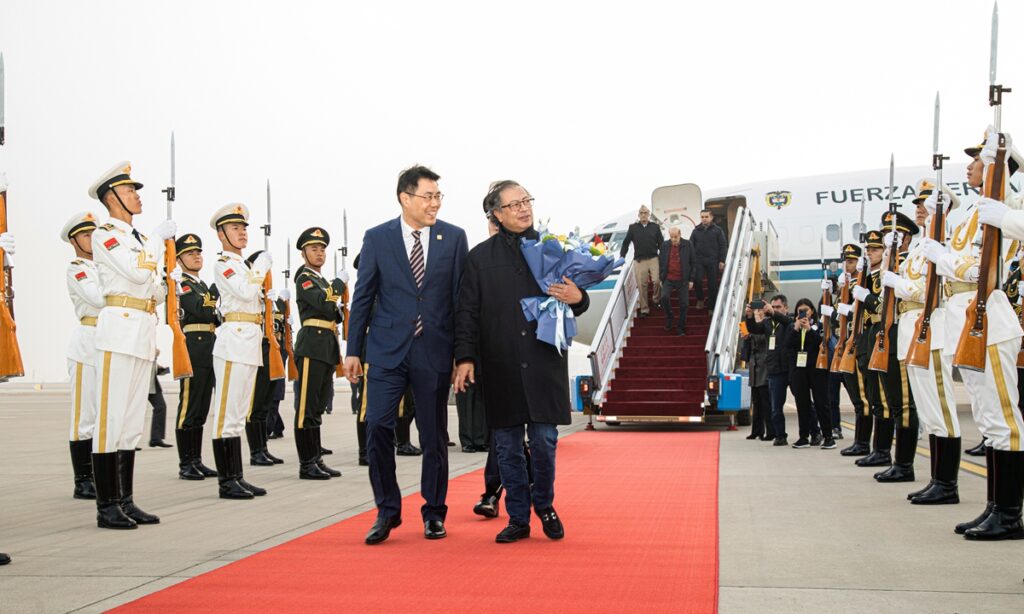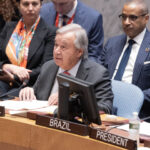Chinese President Xi Jinping held talks with President of the Republic of Colombia Gustavo Francisco Petro Urrego, who is on a state visit to China, in Beijing on Wednesday. The two heads of state charted the course for the development of the China-Colombia relationship in the new era by announcing the elevation of bilateral relations to a strategic partnership.
China has been gaining more attention among Latin American countries. It is not just because China can bring them more development opportunities to boost their economies, but also because the Asian power can be a partner in improving global governance and international order, experts noted.
Petro arrived in Beijing for his three-day state visit on Tuesday. This is the Colombian president’s first state visit to China after he took office in 2022.
Xi pointed out that in the 43 years since the establishment of diplomatic relations between China and Colombia, the bilateral relationship has withstood the test of international changes and maintained a good development momentum. The establishment of a strategic partnership between China and Colombia is the result of long-term efforts by both countries and reflects mutual trust and cooperation which needs to be cherished and continuously enriched.
Xi believes that China’s high-quality development and modernization process will bring new development opportunities to countries around the world, including Colombia. As developing countries, both sides need to strengthen communication and cooperation in international affairs, and safeguard the common interests of developing countries and international fairness and justice.
Petro expressed that Colombia welcomes Xi’s Global Development Initiative, Global Security Initiative and Global Civilization Initiative, and is willing to strengthen communication and cooperation with China within multilateral mechanisms. Colombia is willing to maintain communication with China on issues such as the Israel-Palestine conflict and promote the early finding of a solution to cease-fire and cooling down the situation, he said.
The two heads of state attended a signing ceremony, jointly witnessing the signing of multiple bilateral cooperation documents in the fields of industrial investment and trade, digital economy, green development, agriculture, science and technology, education and culture, inspection and quarantine.
Xi welcomes Colombia to join the co-building of the Belt and Road Initiative (BRI) for common development and prosperity, to which the Colombian president attaches great importance. After establishing a strategic partnership, the Colombian side is willing to align its geographical advantages and development strategies with the BRI, according to Petro.
Experts pointed out that Petro’s visit will elevate the development of the China-Colombia relationship to a new stage.
Even though Colombia has not officially joined the BRI yet, cooperation between the two countries within the framework will be taken to another level, Xu Shicheng, a research fellow at the Institute of Latin American Studies at the Chinese Academy of Social Sciences, told the Global Times on Wednesday.
“Petro, who has strong wishes to boost infrastructure construction after taking office, expects to leverage China’s financial resources, technology and management experience to help achieve the goal of modernizing Colombia’s infrastructure development. He also wishes to expand the exports of agricultural and livestock products to China, Sun Yanfeng, director of Latin American research at the China Institutes of Contemporary International Relations, told the Global Times on Wednesday.
In 2025, Colombia will assume the rotating presidency of the Community of Latin American and Caribbean States (CELAC).
Xi emphasized that China attaches great importance to the development of China-Latin America relations and is willing to continue supporting the integration process in the Latin American and Caribbean region. He expressed the willingness to work with Latin American countries to promote the steady and long-term development of China-Latin America relations, taking the 10th anniversary of the establishment of the China-CELAC Forum in 2024 as an opportunity.
In the past few months, leaders from Latin American countries have been frequently visiting China and reaching multiple agreements with the country. Last week, Chilean President Gabriel Boric visited China and attended the third Belt and Road for International Cooperation. Last month, Venezuelan President Nicolas Maduro made a state visit to China. In April and June, Brazilian President Luiz Inacio Lula da Silva and Honduran President Xiomara Castro, also visited China.
Sun said that these frequent visits to China reflect these countries’ demands and appeals for comprehensive cooperation, rather than just because of the opportunities in finance, technology and trade offered by China.
“For example, Brazil hopes to receive China’s strategic support in global governance issues such as environmental protection, the Russia-Ukraine conflict and Israel-Palestine conflicts. Venezuela hopes China will oppose the hegemonism the US imposed on it. Chile and Argentina wish to have mutual talks with China over how to promote a development path that suits their own country, in the current uncertain international landscape. For Honduras, it wishes to have comprehensive cooperation with China in politics, development concepts and trade,” Sun said.
As a number of countries in Latin America are currently governed by left-wing or center-left parties, their governments tend to have much warmer relations with China economically as well as politically. This also demonstrates the exemplary effect of the BRI and other China-Latin America cooperation in the region, observers noted.
(Global Times)




